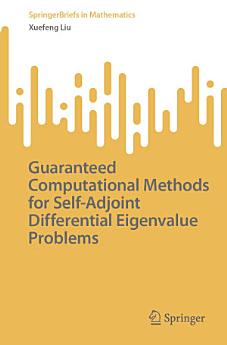Guaranteed Computational Methods for Self-Adjoint Differential Eigenvalue Problems
About this ebook
To achieve quantitative error estimation, the monograph begins with an extensive analysis of the hypercircle method, that is, the Prager–Synge theorem. It introduces a novel a priori error estimation technique based on the hypercircle method. This facilitates the explicit estimation of Galerkin projection errors for equations such as Poisson's and Stokes', which are crucial for obtaining lower eigenvalue bounds via conforming FEMs.
A thorough exploration of the fundamental theory of projection-based explicit lower eigenvalue bounds under a general setting of eigenvalue problems is also offered. This theory is extensively detailed when applied to model eigenvalue problems associated with the Laplace, biharmonic, Stokes, and Steklov differential operators, which are solved by either conforming or non-conforming FEMs.
Moreover, there is a detailed discussion on the Lehmann–Goerisch theorem for the purpose of high-precision eigenvalue bounds, showing its relationship with previously established theorems, such as Lehmann–Maehly's method and Kato's bound. The implementation details of this theorem with FEMs, a topic rarely covered in existing literature, are also clarified.
Lastly, the monograph introduces three new algorithms to estimate eigenfunction approximation errors, revealing the potency of classical theorems. Algorithm I extends Birkhoff’s result that works for simple eigenvalues to handle clustered eigenvalues, while Algorithm II generalizes the Davis–Kahan theorem, initially designed for strongly formulated eigenvalue problems, to address weakly formulated eigenvalue problems. Algorithm III utilizes the explicit Galerkin projection error estimation to efficiently handle Galerkin projection-based approximations.
About the author
Xuefeng Liu is a Professor at Tokyo Woman's Christian University since 2023. He earned his bachelor's degree from the University of Science & Technology of China (1998-2003) and obtained his Master's and PhD degrees at the University of Tokyo by 2009. Liu was an Assistant Professor at Waseda University until 2014, then an Associate Professor at Niigata University until 2023. His research focuses on numerical error analysis for differential equations, especially verified computation for eigenvalue problems, and developing computer-assisted mathematical proofs for the Navier-Stokes equations in 3D domains.








